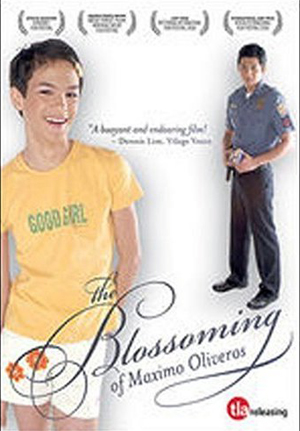
THE BLOSSOMING OF MAXIMO OLIVERAS
Philippines, 2005, 100 minutes, Colour.
Nathan Lopez, J.R. Valentin, Soliman Cruz, Neil Ryan Sese, Ping Medina.
Directed by Aureaus Solito.
The Blossoming of Maximo Oliveras is a small-budget film made with digital cameras. It was filmed in the streets of Manila, in the slums, a story of a criminal family and their survival.
These are the themes so prevalent in so many of the Tagalog films coming from Manila. The theme is social injustice and poverty – with a significant absence of the presence of the church except for devotional statues and pictures.
The film also follows the lead of many Filipino directors in focusing on gay themes and characters. Maximo is a young boy, fond of dressing in women’s clothes and uncomplainingly doing all the family domestic work. He also covers for them, especially his older brothers, in their activities.
When a policeman, Victor, an idealistic young officer, comes into the precinct, he becomes very friendly with him. Victor is sincere in his work against criminals and confronts the family. However, the authorities are on the take and there is collusion between criminals and police. When Victor himself is bashed, Maximo goes from his home to look after him – with dire results for both.
There is a genuine human feeling about the writing and direction of this film, a sympathy for the young boy and his need for establishing his identity, on his need for a family, a place in the family, and yet his breaking free of their constraints as well as the nature of a strong friendship with the young policeman. The incidental background provides a great deal of visual impact for the situation of so many millions of people in the city of Manila.
1. The authentic life of Manila City? The filming on location? The range of characters, poverty, crime, religion? Authentic?
2. The use of video camera work, hand-held, stylish for views of Manila, the tracking shots giving a sense of movement within Manila life? Colour photography, bright, dark? The musical score?
3. The title, the focus on Maxie? The nature of his blossoming?
4. The introduction to the characters, the steady tracking through the streets, the beauty, the flowers, the colour? The squalor? The people, poverty, clothes, shops, haggling? The criminal element? The police?
5. The focus on Maxie, twelve years, acting like a girl, the expectations of him and his pre-teen being gay? This taken for granted within the family? The other similar boys? Friendships? Talking together, girlish manner, women’s role in the family? The dead mother and her shrine? Maxie taking her place? The pageantry of the fashion show and the boys dressing up for competition as glamorous women? The background to the family story, Maxie and his emotions, relationship with his family, defending them, being taught to do the right thing, his attraction towards the policeman and helping him?
6. Maxie, at home, cooking the meals, doing the sewing? Wandering the city? His love for his father? His older brothers? His knowing their criminal activity? Going with his friends to watch DVDs? His wanting to grow up and sell DVDs? Issues of piracy? His being attacked in the street, being rescued by Victor? Indebted to him? Liking him? Going to the police station and the police comment? His going to his house, helping him with his meal, their discussions? Victor being bashed and Maxie rescuing him, tending him, staying the night, the shower sequence? The bond between the two? Victor and his moral stance, the criminals? His wanting to break from Maxie? The shootings, Maxie and his grief for his dead father, the shrine for father and mother? The changes that these experiences forced on him? Getting ready for school, older, walking down the street, passing the police? Walking into a future? What kind of future?
7. The portrait of the father, bringing up his sons, the dead mother? His devotion to her? Saying that he brought his sons up to be thieves and not killers? The deals, the influence with the police, the pay-offs? The scenes at home, generous with his money, love for Maxie, getting him to do the shopping? His reaction to the death of the student, his son being the killer? Maxie and his relationship with Victor, his tolerating it? Victor and his stances, accusing his son? Organising the bashings and taking part? The new police chief, the past antagonism, the confrontation, the police chief shooting him?
8. The two sons, the older, his working with his father as a thief, the mobile phones? His caring for Maxie and bringing him up? For his younger brother? The dilemma, the shooting of the student, the police investigation, his father’s anger? The bashing of Victor? Boggs, the younger son, happy-go-lucky, with Maxie, with the girls around the street? His place in the home, taking the blame for the shooting? Participating in the bashing?
9. Victor, coming from the provinces, a good man, devout? His rescuing Maxie? Their friendship, talking with him? At home? At the police station, the other police taunting him? His investigation of the dead student, the accusations, pressuring Maxie to give him information? His being bashed? Maxie rescuing him? The aftermath, the new police chief, wanting to promote him – but asking him to exercise violence? His future in the police force?
10. The Manila police, the toughs, the officials, at the station? Bribes, a way of life? The new police chief, tough, violent?
11. The ordinary people in the neighbourhood, their shops, dealings, ordinary life? The poverty of their homes, clothing, occupations?
12. An interesting glimpse of Philippine life? The contrast with other cultures and other lands? The role of religion, prayer and superstition – despite evil, corruption and crime?